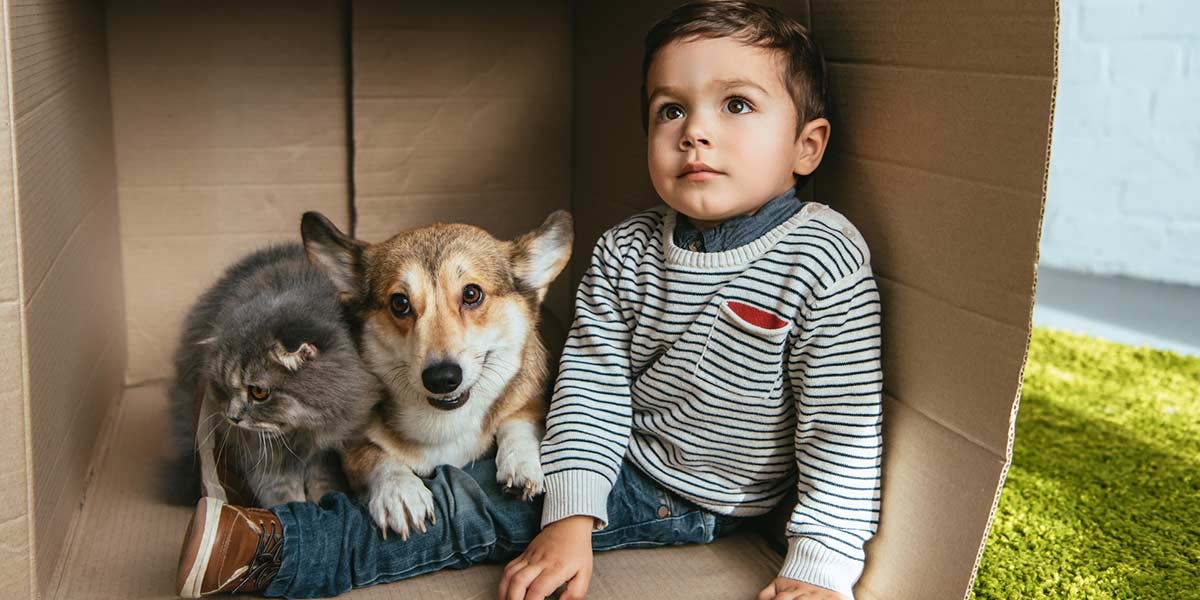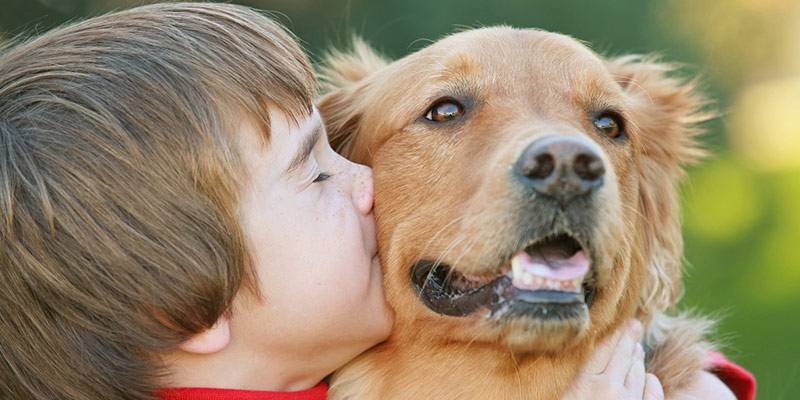
Picking out new floors for your home can be a fun time. But families with kids and pets understand that it’s a decision that takes much consideration. Is hardwood the best floor to withstand your cat’s claws? What floor is best for the playroom so your kids can play with the dog?
To help wade through the decision, we interviewed the experts at Bona and the American Kennel Club and highlighted information from our own flooring trends survey to give some input on the best pet and child-safe flooring options.
As with any decision, there are pros and cons to think about. Particularly if you are like 18% of our survey respondents who said their new flooring was to welcome a new child or pet to the family. For the purposes of this guide, we considered the following factors on a five-point scale to determine the best flooring types for kids and pets:
Best for: Families with young children and older or less-active pets.
Not recommended for: Play areas for active pets.
Ideal rooms: Basement, bedroom, kitchen, hallways and living room.
Laminate floors often copy the look of hardwood or tile, but without the expensive price tag. Our survey shows that the average laminate flooring project came in at $1,877, making it one of the most cost-effective options. Laminate is a great option for families with younger children because it is easy to clean and fairly water-resistant (provided you don’t let a spill sit too long).
This floor type is one of the most comfortable non-padded styles available, which is great for when your dog wants to lay down for a while. Additionally, scratches won’t happen easily, but an active pet or one with longer claws can leave some marks.

“The only potential issue with this type of flooring is that the layer that protects the laminate is very slippery and can have your pet skidding all over the place. If you’re going to go with laminate, consider a finish with some texture to help your buddies get traction.”
Dr. Jerry Klein | Chief Veterinary Officer, American Kennel Club
Best for: Kids and pets of all ages.
Not recommended for: Active pets and children.
Ideal rooms: Bathroom, basement and kitchen.
Another tried and true flooring option is tile. Whether you opt for stone, ceramic, marble or porcelain, it’s a classic look that fits with nearly any décor style. The high scratch- and water-resistance makes tile an ideal kid and pet friendly flooring option. Additionally, these materials are fairly easy to clean, but the grout can be an issue. “With tiles, keeping the grout clean might be a challenge,” Klein said. “But for most pet owners, tile can be a smart, liquid-proof surface with tons of different design options, even faux wood tiles.”
However, tiled floors do have some drawbacks. If a piece cracks, you will most likely need to replace the entire square. Plus, there is a strong possibility of damage to the surrounding tiles when you work on the replacement. Also, standing or laying on the surface for long periods of time can be painful.
Best for: Families with older children and pets.
Not recommended for: Homes with crawling toddlers or people who don’t want scratches appearing on dark floors.
Ideal rooms: Bedroom, living room and hallways.
Hardwoods are an ideal flooring investment for families as they can be refinished multiple times. While they can be scratched and aren’t as water-resistant, if you sand and re-stain them, they can look as good as new — providing the scratches are not too deep and the water hasn’t resulted in warping of the wood.
“The timeframe for refinishing floors depends on how much traffic and wear the floor might experience. A home with high foot traffic, pets and kids might need attention more often than a home with lighter wear. Everything from shoes to furniture to pets will create wear on the surface of the floor. If it’s time for a refinish, the good news is that there are a wide range of colors, products and textures available.”
Heather Lindemann | Bona
Hardwood can be easily cleaned, but it may require a bit of elbow grease with a polisher to regain its initial sheen.
The confusion for hardwood, though, can come from the number of types available. If you want durability that will not show scratches easily, consider Natural Australian Cypress, Antique Strand Bamboo or Vintage Honey Oak.
While an extremely sturdy flooring type, it can be a bit uncomfortable at times, particularly if your hardwood has natural bumps and grooves to prevent a flat surface from wall-to-wall.
Best for: Younger children or older pets who are prone to falling.
Not recommended for: Young pets that are still house-training and areas where children will be eating.
Ideal rooms: Bedroom, basement, hallways, family room playroom.
Carpet is soft and comfortable for kids and pets, and it’s a staple of the flooring industry. It’s the perfect floor type for crawling infants or toddlers taking their first steps. Your furry friends will love the feel under their paws as they run through the house. However, picking a proper carpet type is key when you have animals.
“Popular varieties of luxurious wool carpeting may not stand up well to daily wear and tear,” Klein said. “The biggest problem with pets is their nails. Even well-trimmed nails can gouge hardwood and snag carpet. Muddy paws and pets that are not yet housebroken are also a bad match for carpeting.”
Keep in mind that there are waterproof carpet options out there, but the chemicals used to treat and create it may not be the best for your pets or kids. Plus, you’ll be sacrificing a bit of comfort with these types of carpet.
If you have pets, expect frequent vacuuming to get rid of shed fur, and you’ll need to clean up the spilled apple juice quickly. Cleaners, particularly ones that are made for pets, can help once a stain has set in, but they may not be able to restore the carpet to perfection.

“Some stains and smells can be difficult to remove, even with the best industrial-strength cleaners.”
Dr. Jerry Klein | Chief Veterinary Officer, American Kennel Club
If stains or smells do ultimately become a problem, don’t fear replacement. According to our study, carpet was the least-expensive material to use for a flooring project, coming in at nearly $200 cheaper than the next closest alternative.
Best for: Active children and pets.
Not recommended for: Pets prone to bathroom accidents and children who often spill drinks.
Ideal rooms: Playroom and basement.
Rubber flooring is one of the more interesting flooring types available. It’s great for children and pets due to its ability to resist scratches, built-in cushion and waster-resistance. However, it’s a flooring type that is not often seen, and when it is, it’s obvious that the room is specifically for children.
One of the biggest benefits of rubber flooring is that it’s easy to clean. However, if a pet uses a rubber floor as a bathroom, be quick to act. While the floor won’t absorb the accident, it will let it run freely, possibly between the panels.
A potential detractor for rubber floors is the resale value. If you’re selling to a family with young children it can be a potential plus. However, if the buyers looking at your home don’t plan on having children or pets, they may simply see a flooring project they will need to do.
Best for: All pets.
Not recommended for: Children prone to falls.
Ideal rooms: Basement, mudroom and entryway.
It may not be the most visually appealing flooring type, but if you are looking for a floor that won’t need to be replaced due to wear and tear of kids and pets, concrete is the answer. Concrete is one of the best flooring options for high traffic areas, which is why it’s often seen in mudrooms and entryways. It’s built to last and chances are that you won’t have to replace it unless your style changes over time. As an added perk, the concrete will naturally grind your pet’s claws, helping to keep them at an ideal length.
However, it can absorb water if not properly sealed, which can lead to issues with mold or mildew. On top of that, don’t expect any forgiveness if you fall down. It would be best to avoid this floor type if you have infants who are still in the crawling stage or toddler starting to walk.

“Concrete resists scratches of all kinds, is easy to clean in case of accidents and doesn’t collect pet fur. When using poured concrete, it gives off a stylish, industrial look. The downside is that it’s hard and can be quite cold in winter.”
Dr. Jerry Klein | Chief Veterinary Officer, American Kennel Club
Best for: Toddlers and families with allergies.
Not recommended for: Rooms with heavy furniture or lots of sunlight.
Ideal rooms: Playrooms.
While it may seem strange to use as a surface in your home, cork floors are growing in popularity due to their eco-friendly source. Cork is also naturally antimicrobial, so it reduces mold growth and other allergens. For families with young children, this can make a huge impact on your health, especially if used in a playroom. Additionally, it is one of the softest surfaces you can use for a floor, which is great for infants and toddlers, as well as the older pet who just wants to take a nap. It’s fairly low-maintenance, provided you are not trying to sop up water.
If you’re looking for a wood surface in your home, but are worried about your pet’s claws, cork might be the best route. While it will scratch, it won’t be as noticeable.
“Cork flooring is more adaptable to claws of dogs and cats than many other natural wood flooring options due to the general resilient nature of cork flooring, but it will still show scratch marks,” Klein said.
Picking the right floor may seem like a major task, but keep in mind that you don’t have to select one floor for your whole home. You can go with kid friendly flooring ideas like cork or rubber in the playroom, give your cat a plush carpet for sunbathing in the family room and your dog a cool laminate in the kitchen. We all love our kids and pets and want to do everything we can to make them happy and keep them healthy.
Ready to get moving on a flooring project? Check out our guides on how to remove carpet, hardwood, tile or vinyl. Don’t forget that you’ll need to throw away your old floor, and a roll off dumpster is a great option.








